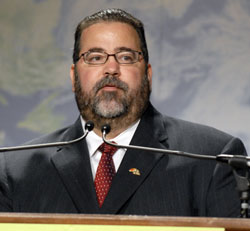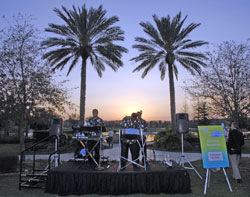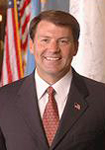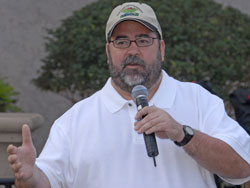 The Reverend of Renewable Fuels got up and preached a powerful sermon today on the state of the ethanol industry. Bob Dinneen, President of the Renewable Fuels Association, gave his annual state of the industry speech this morning.
The Reverend of Renewable Fuels got up and preached a powerful sermon today on the state of the ethanol industry. Bob Dinneen, President of the Renewable Fuels Association, gave his annual state of the industry speech this morning.
Speaking before more than 2,200 attendees at the 13th Annual National Ethanol Conference in Orlando, Florida, he declared that the state of the U.S. ethanol industry is sound:
“With your continued commitment, I can report to you without exaggeration or hyperbole that the state of the U.S. ethanol industry is sound, that we are prepared to meet the opponents of change with facts, with a resolute spirit, and with renewed dedication to the proposition that together we can change our nation’s energy, economic and environmental destiny.”
The complete text of Dinneen’s State of the Ethanol Industry Address can be found here (pdf).
You can listen Bob’s speech here: [audio:http://www.zimmcomm.biz/rfa/nec-08-dinneen-speech.mp3]


 Biofuels will be in the spotlight throughout the conference and the yet-to-be-completed Farm Bill will likely be a major topic of conversation as new agriculture secretary Ed Schafer will address the crowd on Friday during the general session.
Biofuels will be in the spotlight throughout the conference and the yet-to-be-completed Farm Bill will likely be a major topic of conversation as new agriculture secretary Ed Schafer will address the crowd on Friday during the general session. 
 The City of New Orleans will be running the buses that replace the losses from Hurricane Katrina on biodiesel.
The City of New Orleans will be running the buses that replace the losses from Hurricane Katrina on biodiesel. Gadsden, Alabama is getting into the swing of biodiesel… and it’s depending on the community to help fuel the green move.
Gadsden, Alabama is getting into the swing of biodiesel… and it’s depending on the community to help fuel the green move. It has been a great first day here at the National Ethanol Conference.
It has been a great first day here at the National Ethanol Conference.  The new leaders of the Midwest Governors Association (MGA) are committing their group to the advancement of the biofuels they see as the future for their region.
The new leaders of the Midwest Governors Association (MGA) are committing their group to the advancement of the biofuels they see as the future for their region. “I am honored to lead the Midwestern Governors Association over the next year,” said Rounds. “Our region has been blessed with many resources that we can use to address the challenges facing our states. Specifically, I am eager to work with my fellow governors to make sure the Midwest’s transportation infrastructure is maintained in the new federal Transportation Bill.”
“I am honored to lead the Midwestern Governors Association over the next year,” said Rounds. “Our region has been blessed with many resources that we can use to address the challenges facing our states. Specifically, I am eager to work with my fellow governors to make sure the Midwest’s transportation infrastructure is maintained in the new federal Transportation Bill.”  “As governors of our respective Midwestern states, we are committed to building a stronger alternative-energy economy that lessens our dependence on foreign oil and creates jobs in the process, said Granholm. By working with Gov. Rounds to improve our region’s transportation needs, we will make Midwestern states more competitive in this global economy.”
“As governors of our respective Midwestern states, we are committed to building a stronger alternative-energy economy that lessens our dependence on foreign oil and creates jobs in the process, said Granholm. By working with Gov. Rounds to improve our region’s transportation needs, we will make Midwestern states more competitive in this global economy.”  Here at the National Ethanol Conference golf is the first activity. RFA President Bob Dinneen got everyone started here this morning out at ChampionsGate golf course. Just before he gave everyone the send off I spoke to him about the Conference.
Here at the National Ethanol Conference golf is the first activity. RFA President Bob Dinneen got everyone started here this morning out at ChampionsGate golf course. Just before he gave everyone the send off I spoke to him about the Conference. NFL Hall of Famer Jack Youngblood is also on hand with us here today at the golf tournament. He welcomed everyone out at the start of the event.
NFL Hall of Famer Jack Youngblood is also on hand with us here today at the golf tournament. He welcomed everyone out at the start of the event.
 And he talked about cellulosic ethanol. “We recognize that in order to grow our industry we need to move beyond grain,” and Dinneen says it is already happening.
And he talked about cellulosic ethanol. “We recognize that in order to grow our industry we need to move beyond grain,” and Dinneen says it is already happening. It’s time for the National Ethanol Conference. I’ll be providing on the scene coverage once again this year and working closely with the Renewable Fuels Association again, including posting onto
It’s time for the National Ethanol Conference. I’ll be providing on the scene coverage once again this year and working closely with the Renewable Fuels Association again, including posting onto  The American Wind Energy Association, a Washington, D.C.-based trade group, estimates the industry employs about 20,000 people, not including those making turbines or other equipment.
The American Wind Energy Association, a Washington, D.C.-based trade group, estimates the industry employs about 20,000 people, not including those making turbines or other equipment.